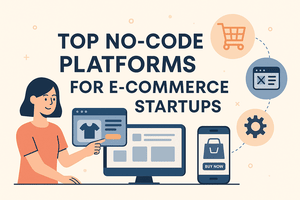Top No-Code Platforms for E-commerce Startups: Empowering Growth Without a Single Line of Code
In the fast-paced world of e-commerce, launching an online store used to be a complicated and expensive venture. But with the rise of no-code platforms, the playing field has been leveled. Entrepreneurs no longer need to know programming languages or hire developers to start and scale their businesses online. Today, building an e-commerce site can be as simple as dragging and dropping elements on a screen.
No-code tools empower e-commerce startups by enabling quick launches, reduced costs, and flexible customization. This article explores the top no-code platforms that are revolutionizing the e-commerce landscape, providing startup founders with the tools to turn ideas into revenue-generating ventures—without touching a single line of code.
Why No-Code is a Game-Changer for E-commerce Startups
Before diving into the top platforms, it’s important to understand why no-code tools are gaining massive popularity:
-
Faster Launch Times: Entrepreneurs can go from concept to a fully functional e-commerce store in days rather than weeks or months.
-
Lower Development Costs: With no need to hire developers, startups save thousands of dollars during the initial phase.
-
User Empowerment: Non-technical founders can fully control their online store, including layout, design, payment integration, and product management.
-
Scalability and Integrations: Most no-code platforms support integrations with marketing tools, payment gateways, CRMs, and analytics.
1. Shopify: The Industry Leader in No-Code E-commerce
Shopify is arguably the most popular no-code e-commerce platform in the world. With over 4.4 million websites built on its platform, Shopify is known for its simplicity, scalability, and robust ecosystem.
Key Features:
-
Drag-and-drop store builder
-
Built-in payment processing via Shopify Payments
-
Access to 8,000+ apps and integrations
-
Mobile-optimized themes
-
Multichannel selling (Amazon, Instagram, Facebook)
Best For: Entrepreneurs who want a reliable, scalable, and easy-to-use solution with strong customer support.
Limitations: Monthly fees and additional charges for apps can add up.
2. Wix eCommerce: Intuitive and Visually Driven
Wix has expanded its offerings to include e-commerce functionalities, making it one of the best visual website builders for new startups.
Key Features:
-
800+ customizable templates
-
Simple drag-and-drop interface
-
App Market for additional functionality
-
Built-in SEO tools
-
Abandoned cart recovery and analytics
Best For: Founders who want full creative control and visually engaging storefronts.
Limitations: May lack deep scalability for large enterprise-level operations.
3. Squarespace: Design Meets E-commerce Simplicity
Squarespace is known for its stunning templates and seamless design capabilities. It’s a favorite for creatives and boutique e-commerce businesses.
Key Features:
-
Award-winning templates
-
Built-in blogging and portfolio support
-
Inventory, orders, and tax management
-
Integrated email marketing
-
Subscription and digital product support
Best For: Designers, photographers, and small product-based brands.
Limitations: Limited third-party app integrations compared to Shopify or Wix.
4. Webflow: Powerful No-Code with Developer-Like Flexibility
Webflow sits between a no-code platform and a professional-grade design tool. It offers advanced customization while keeping coding optional.
Key Features:
-
Fully responsive design control
-
CMS for dynamic content
-
E-commerce with flexible product types
-
Custom animations and interactions
-
Integration with Zapier, Stripe, and Shippo
Best For: Startups with a designer onboard who want full branding control and scalability.
Limitations: Slightly steeper learning curve than other no-code platforms.
5. BigCommerce: Enterprise-Level Power Without Code
BigCommerce is a no-code platform built for growing e-commerce startups aiming for serious scale. It offers native support for B2B and B2C models.
Key Features:
-
Headless commerce support
-
Advanced product filtering
-
API-driven flexibility
-
Multi-currency and multilingual capabilities
-
No transaction fees on any plan
Best For: E-commerce startups planning to scale into global or high-volume operations.
Limitations: Complex features may be overkill for very small stores.
6. Ecwid: Add E-commerce to Any Website
Ecwid is ideal for businesses that already have a website and want to integrate a store without rebuilding everything from scratch.
Key Features:
-
Easily embeddable shopping cart
-
Integrates with WordPress, Wix, Weebly, and more
-
Supports digital products and subscriptions
-
Free forever plan available
-
Mobile POS support
Best For: Startups that already have traffic on a blog or existing site and want to monetize.
Limitations: Customization and theme options are limited compared to full-store builders.
7. Bubble: Visual Web App Builder with E-commerce Capabilities
While not an e-commerce-only platform, Bubble offers the most flexible no-code platform for building advanced web apps, including custom online stores.
Key Features:
-
Full control over workflows and databases
-
Create custom checkout and order systems
-
Plugin marketplace for Stripe, PayPal, etc.
-
Powerful backend logic with front-end design tools
Best For: Tech-savvy founders looking to create hybrid platforms, marketplaces, or unique shopping experiences.
Limitations: Requires more time to build and understand than plug-and-play platforms like Shopify.
8. Zyro: Budget-Friendly and AI-Driven
Zyro offers a lightweight alternative to platforms like Wix or Shopify, focusing on affordability and simplicity.
Key Features:
-
AI-powered content and image generation
-
Fast and easy setup
-
Payment gateway integration
-
Inventory and order management
-
Free SSL, hosting, and domain support
Best For: Solopreneurs and hobbyists looking for a fast, low-cost entry into e-commerce.
Limitations: Not ideal for complex stores or long-term scaling.
How to Choose the Right No-Code Platform for Your Startup
Every e-commerce startup is different. Choosing the right platform depends on your business model, budget, and scalability goals. Here are a few key questions to consider:
-
Do you plan to scale rapidly or stay lean?
-
Is design flexibility more important than advanced features?
-
Do you already have a site and want to integrate a store?
-
Do you want to sell physical, digital, or subscription-based products?
-
What’s your monthly budget for hosting, themes, and apps?
Final Thoughts
No-code e-commerce platforms are no longer just an alternative—they’re often the best starting point for modern online businesses. With intuitive interfaces, powerful integrations, and mobile optimization built-in, these tools enable startup founders to bring their vision to life faster and more affordably than ever before.
Whether you’re launching a handcrafted product line or a dropshipping empire, the right no-code platform can be your most valuable asset. Choose wisely, scale confidently, and let your entrepreneurial journey begin—without writing a single line of code.













